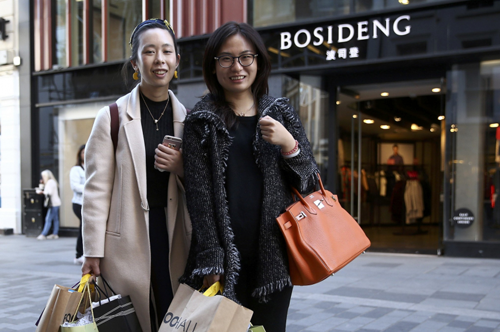Sales figures show huge increase in Golden Week spending in British capital as a tumbling pound and government campaigns have helped retailers.
Chinese tourists Haiti Chen (left) and Jialin Wang brandish shopping bags in
Central London, October 5, 2016.
British bankers, brokers and bureaucrats may be working more overtime as they attempt to gauge, or guess, what a rapidly tumbling pound will do next to the country’s already jittery post-Brexit economy. However, Central London’s high-end store owners are celebrating after a busy Golden Week that saw – according to figures released exclusively to the Asia Times – Chinese tourist spending in the UK capital increase by an astounding 300%.
These sales figures, seen by us on the day the pound fell to its lowest level against the dollar since 1985, cover retail purchases by Chinese shoppers across London’s West End, the capital’s core shopping district. They span a year-on-year period until October 9th 2016, the day that marks the formal end of the People’s Republic of China’s Golden Week holiday. During this period, London’s West End retail purchases by Chinese consumers increased by 307% year-on-year, with the average transaction value increasing by 109% to now stand at a staggering £1,256.
There were worries in London in 2015 about a Chinese consumer slump that many retail analysts saw being triggered by President Xi Jinping’s corruption crackdown combined with the general slowdown seen across the China economy. The latest figures, which come on the back of exceedingly strong summer 2016 retail sales, firmly quash these fears and leave London’s retail sector in a resolutely bullish mood.
“The West End had a remarkable July sales period which saw £400million total spend,” said Jace Tyrrell, Chief Executive of New West End Company, the retail trade organisation that compiled the data in partnership with multi-currency retail transaction facilitator Premier Tax Free. “This year’s Golden Week was always set to be a very different story to last year, when spend from Chinese visitors was down 8% on the same period in 2014, following China’s stock market crash.”
China’s Golden Week, first implemented by the Central Government in 1998 primarily as a means of boosting the economy through domestic tourism, is a week-long national holiday held twice a year – first during the Lunar New Holiday in January or February, then again on a week that runs close to China’s October 1 National Day.
Something like 750 million people now travel during these two periods, either to visit relatives or for vacations, with increasing numbers now venturing overseas. An estimated five million Golden Week tourists left China in 2016 and many now eschew organised tours to travel independently. This new type of Chinese travellers is being targeted by an ever increasing array of enticements that would have been the stuff of fantasy even just five years ago. In the UK these range from Putonghua-speaking concierges in suburban London shopping malls to a UK tourism body advising hoteliers to provide “Pot Noodle” snacks in hotel mini-bars to keep their Chinese guests on the premises.
This can all be seen as part of a wider strategy that formally came into play at the end of August when the UK Prime Minister Theresa May sought to place more emphasis on inbound tourism, already worth £26 billion annually to the UK economy, and launched a “Tourism Action Plan”. China – now Britain’s 10th most valuable inbound visitor market – featured prominently, with the national tourist body VisitBritain launching its digital “GREAT China Welcome Programme” across China. The campaign began with a four-week partnership involving Hainan Airlines, part of HNA Group, and the online Chinese travel agent tuniu.com, aimed at making it easier for Chinese travellers to book a holiday to Britain. That included an initiative that allows Chinese tourists to apply for a two-year multiple-entry visitor visa.
“The UK is offering great value for Chinese travellers at the moment”, VisitBritain Chief Executive Sally Balcombe said.“As well as making it easier to get here with increased route development and airline seat capacity, we’re working with our partners to get great tactical deals in market and increasing the services that visitors experience.”
VisitBritain has ambitions to double the spend from Chinese visitors to £1 billion annually by 2020 and it’s a strategy that – thanks to the plummeting pound – looks set to stay on target for the rest of 2016, at least. Latest flight booking data from ForwardKeys shows bookings from China to the UK are up 24% for October to December 2016 compared to the same period last year.
It’s not just Chinese consumers who have benefited from the sinking of Sterling, though. British luxury goods brands have also benefited, in the short-term at least, from the Brexit vote, with Burberry soaring from a four-year share price low of little over £10.00 a share just before the June 2016 EU referendum to more than £15.00 in October. This has added more than £2bn to the market value of the company and has led Deutsche Bank to estimate Burberry will enjoy £120m more in currency benefits during the rest of this current financial year.
So while the UK continues to vex over Brexit, hundreds of thousands of Chinese shoppers have returned home with their neat branded bags full of luxury bargains. Will they return again soon? That may well depend on the pound.
